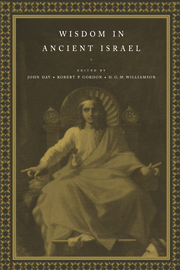Book contents
- Frontmatter
- Contents
- List of abbreviations
- Introduction
- Part 1 The ancient near eastern setting
- Part 2 Old Testament and Apocryphal texts
- Part 3 Themes
- 17 Were there schools in ancient Israel?
- 18 The trees, the beasts and the birds: fables, parables and allegories in the Old Testament
- 19 The personification of Wisdom
- 20 Wisdom and the goddess
- 21 Wisdom at Qumran
- 22 The interpretation of wisdom in nineteenth-century scholarship
- 23 Wisdom and Old Testament theology
- Biographical note: John Adney Emerton
- Bibliography of the works of John Adney Emerton
- Indexes
- Principal biblical and apocryphal references
19 - The personification of Wisdom
Published online by Cambridge University Press: 16 October 2009
- Frontmatter
- Contents
- List of abbreviations
- Introduction
- Part 1 The ancient near eastern setting
- Part 2 Old Testament and Apocryphal texts
- Part 3 Themes
- 17 Were there schools in ancient Israel?
- 18 The trees, the beasts and the birds: fables, parables and allegories in the Old Testament
- 19 The personification of Wisdom
- 20 Wisdom and the goddess
- 21 Wisdom at Qumran
- 22 The interpretation of wisdom in nineteenth-century scholarship
- 23 Wisdom and Old Testament theology
- Biographical note: John Adney Emerton
- Bibliography of the works of John Adney Emerton
- Indexes
- Principal biblical and apocryphal references
Summary
In the beginning was the word, i.e., the spoken word of the proverbial saying; in the end was a radiant wisdom (Wisd. vii 26), striding through creation (Ecclus xxiv 5), born of God and rejoicing in the created world (Prov. viii 22–31). There is no journey in the Bible comparable to this, just as there is no personification comparable to that of wisdom. Justice and peace may kiss (Ps. lxxxv 11 [10]), and alcohol may be a rowdy (Prov. xx 1), but only wisdom is given a voice that resembles the Lord's (Prov. viii 35, ‘whoever finds me finds life’). In a summary of the state of research in wisdom literature, Professor Emerton once wrote, ‘A controversial problem of Prov. 1–9 is that of the origin and meaning of the personified figure of Wisdom‥ .’ Those words still hold true, not only for the book of Proverbs, but for all the biblical passages dealing with this mysterious figure.
Two aspects of the problem present themselves immediately. First, are we dealing with a personification, a hypostasis, or a person? This question cannot be answered effectively because there is no agreement on the meaning of these relatively abstract words as they are applied to wisdom. The theological baggage these words have acquired over the years is simply too heavy to bear. Readers will note the specificity of the title of this essay, but they are wary enough to take it in the sense of a directional sign.
- Type
- Chapter
- Information
- Wisdom in Ancient Israel , pp. 222 - 233Publisher: Cambridge University PressPrint publication year: 1995
- 5
- Cited by

